Unit 4 I used to be afraid of the dark. Section A 3a-4c 课件
文档属性
| 名称 | Unit 4 I used to be afraid of the dark. Section A 3a-4c 课件 | 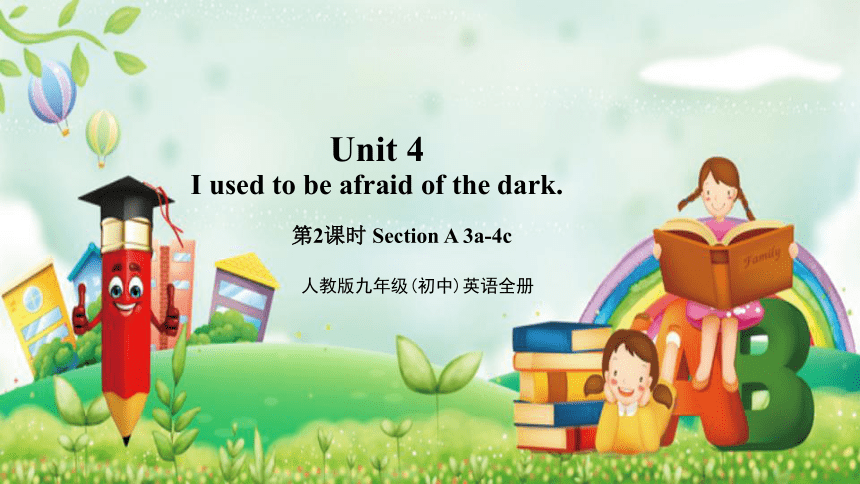 | |
| 格式 | zip | ||
| 文件大小 | 1.2MB | ||
| 资源类型 | 试卷 | ||
| 版本资源 | 人教新目标(Go for it)版 | ||
| 科目 | 英语 | ||
| 更新时间 | 2022-09-24 10:34:28 | ||
图片预览

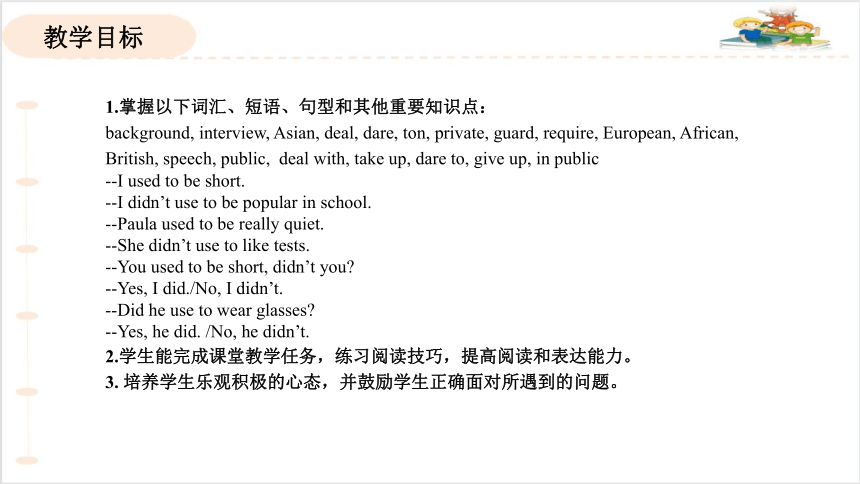
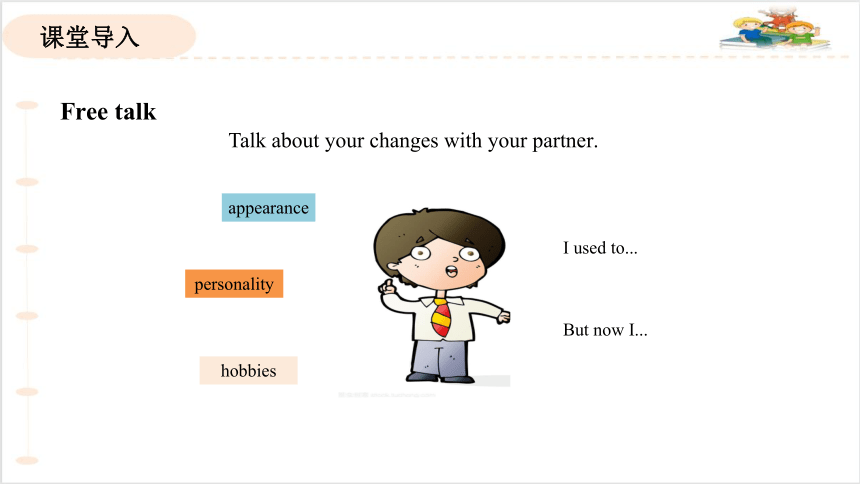
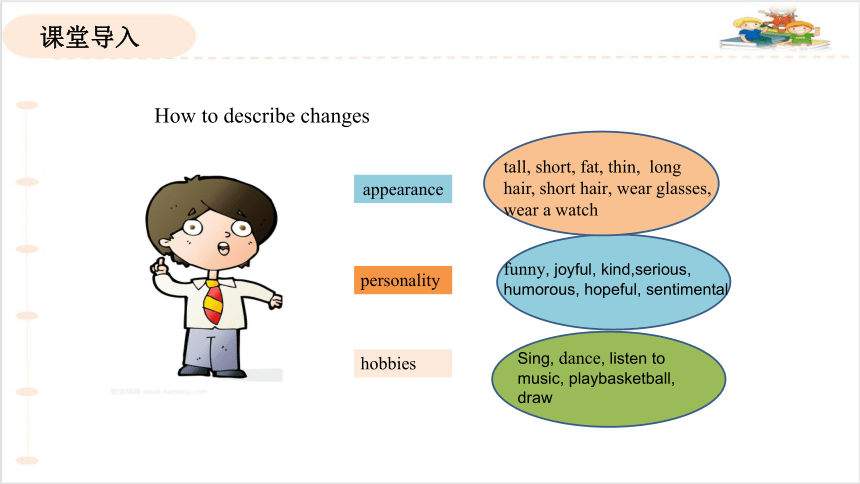
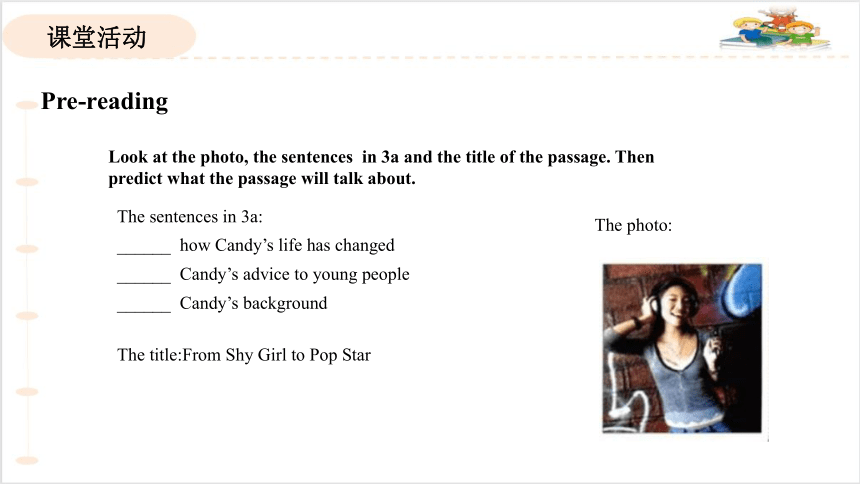
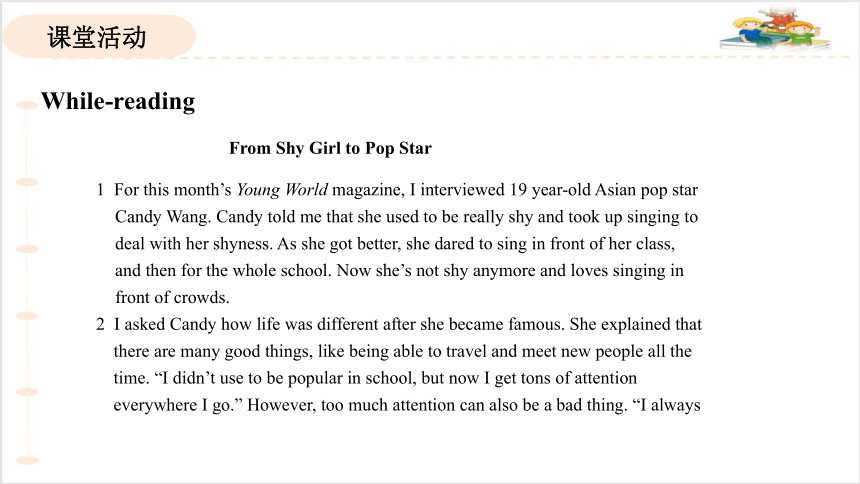
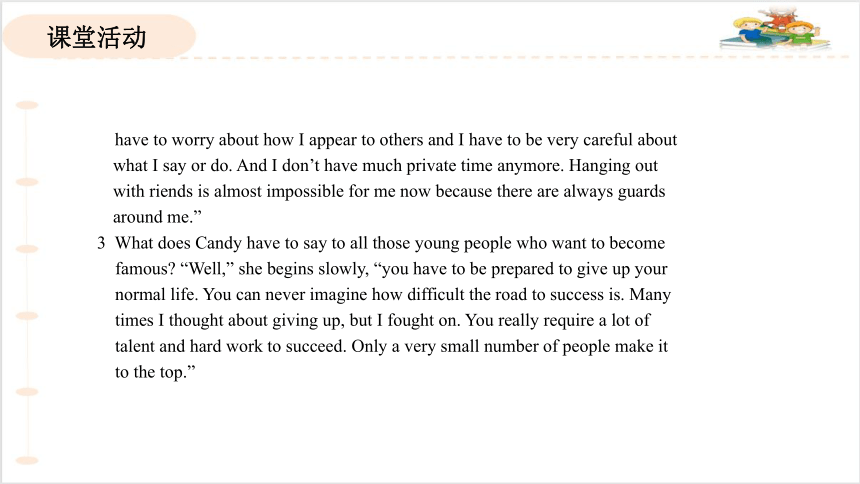
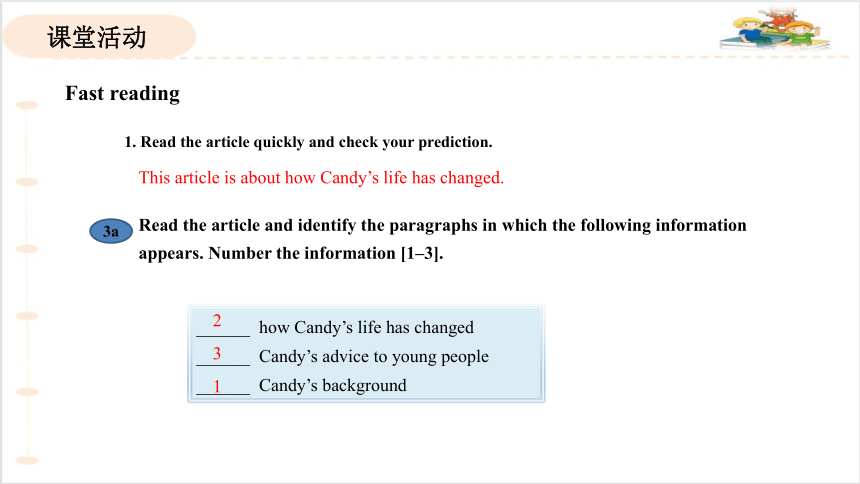
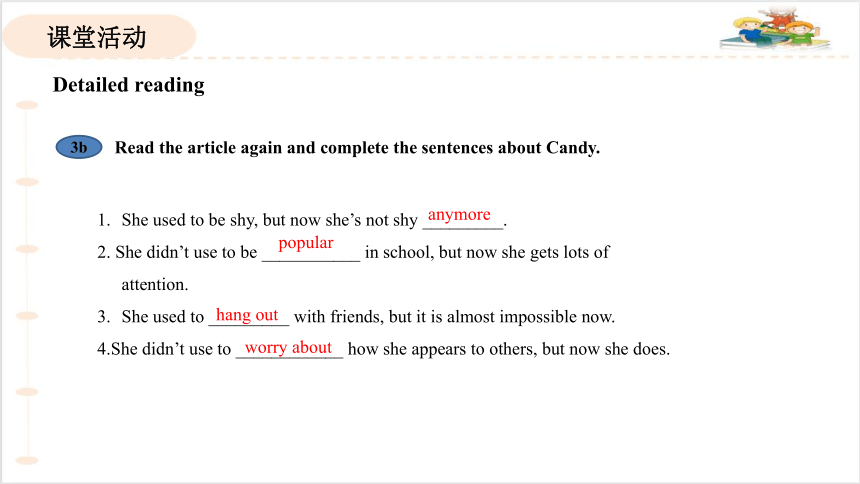
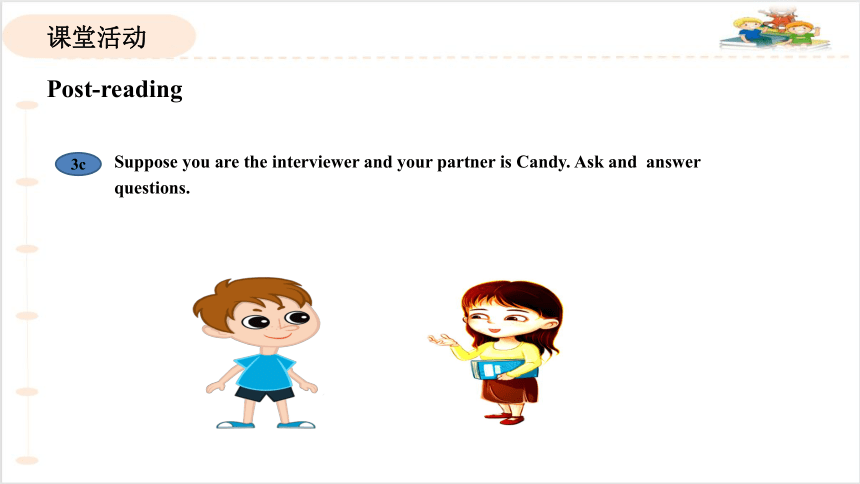
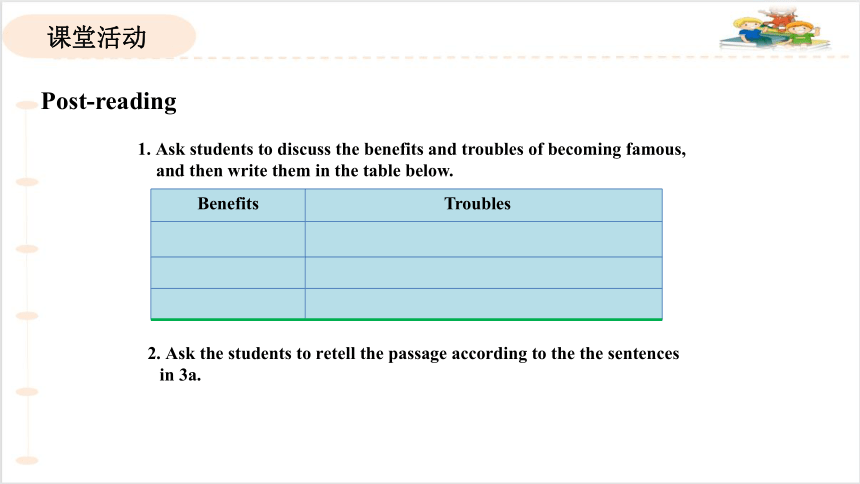
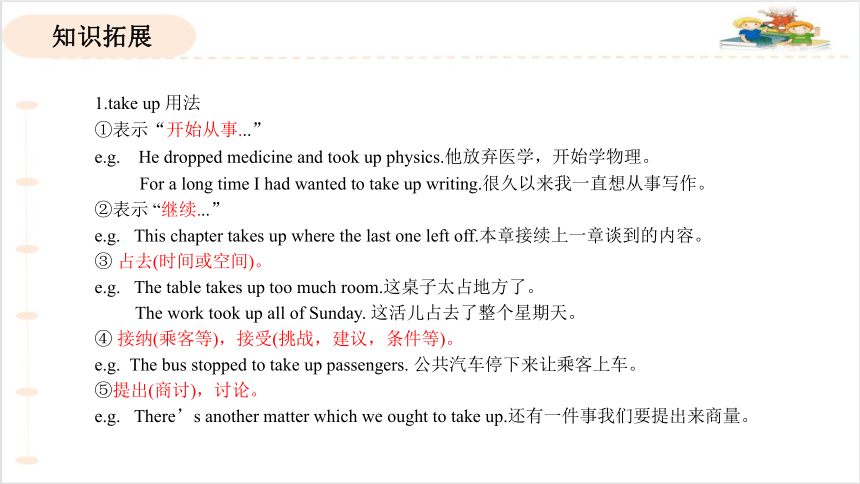
文档简介
(共31张PPT)
人教版九年级(初中)英语全册
Unit 4
I used to be afraid of the dark.
第2课时 Section A 3a-4c
1.掌握以下词汇、短语、句型和其他重要知识点:
background, interview, Asian, deal, dare, ton, private, guard, require, European, African,
British, speech, public, deal with, take up, dare to, give up, in public
--I used to be short.
--I didn’t use to be popular in school.
--Paula used to be really quiet.
--She didn’t use to like tests.
--You used to be short, didn’t you
--Yes, I did./No, I didn’t.
--Did he use to wear glasses
--Yes, he did. /No, he didn’t.
2.学生能完成课堂教学任务,练习阅读技巧,提高阅读和表达能力。
3. 培养学生乐观积极的心态,并鼓励学生正确面对所遇到的问题。
教学目标
Free talk
Talk about your changes with your partner.
I used to...
But now I...
appearance
personality
hobbies
课堂导入
How to describe changes
appearance
personality
hobbies
tall, short, fat, thin, long hair, short hair, wear glasses, wear a watch
funny, joyful, kind,serious, humorous, hopeful, sentimental
Sing, dance, listen to music, playbasketball, draw
课堂导入
Pre-reading
Look at the photo, the sentences in 3a and the title of the passage. Then predict what the passage will talk about.
The sentences in 3a:
______ how Candy’s life has changed
______ Candy’s advice to young people
______ Candy’s background
The title:From Shy Girl to Pop Star
The photo:
课堂活动
While-reading
From Shy Girl to Pop Star
1 For this month’s Young World magazine, I interviewed 19 year-old Asian pop star Candy Wang. Candy told me that she used to be really shy and took up singing to deal with her shyness. As she got better, she dared to sing in front of her class, and then for the whole school. Now she’s not shy anymore and loves singing in front of crowds.
2 I asked Candy how life was different after she became famous. She explained that there are many good things, like being able to travel and meet new people all the time. “I didn’t use to be popular in school, but now I get tons of attention everywhere I go.” However, too much attention can also be a bad thing. “I always
课堂活动
have to worry about how I appear to others and I have to be very careful about what I say or do. And I don’t have much private time anymore. Hanging out with riends is almost impossible for me now because there are always guards around me.”
3 What does Candy have to say to all those young people who want to become famous “Well,” she begins slowly, “you have to be prepared to give up your normal life. You can never imagine how difficult the road to success is. Many times I thought about giving up, but I fought on. You really require a lot of talent and hard work to succeed. Only a very small number of people make it to the top.”
课堂活动
3a
Read the article and identify the paragraphs in which the following information
appears. Number the information [1–3].
______ how Candy’s life has changed
______ Candy’s advice to young people
______ Candy’s background
2
3
1
课堂活动
Fast reading
1. Read the article quickly and check your prediction.
This article is about how Candy’s life has changed.
3b
Read the article again and complete the sentences about Candy.
She used to be shy, but now she’s not shy _________.
2. She didn’t use to be ___________ in school, but now she gets lots of attention.
She used to _________ with friends, but it is almost impossible now.
4.She didn’t use to ____________ how she appears to others, but now she does.
anymore
popular
hang out
worry about
课堂活动
Detailed reading
3c
Suppose you are the interviewer and your partner is Candy. Ask and answer questions.
课堂活动
Post-reading
Post-reading
Benefits Troubles
1. Ask students to discuss the benefits and troubles of becoming famous, and then write them in the table below.
2. Ask the students to retell the passage according to the the sentences in 3a.
课堂活动
1.take up 用法
①表示“开始从事...”
e.g. He dropped medicine and took up physics.他放弃医学,开始学物理。
For a long time I had wanted to take up writing.很久以来我一直想从事写作。
②表示 “继续...”
e.g. This chapter takes up where the last one left off.本章接续上一章谈到的内容。
③ 占去(时间或空间)。
e.g. The table takes up too much room.这桌子太占地方了。
The work took up all of Sunday. 这活儿占去了整个星期天。
④ 接纳(乘客等),接受(挑战,建议,条件等)。
e.g. The bus stopped to take up passengers. 公共汽车停下来让乘客上车。
⑤提出(商讨),讨论。
e.g. There’s another matter which we ought to take up.还有一件事我们要提出来商量。
知识拓展
2. deal with的用法
deal with相当于do with, 常表示“对付”、“应付”、“处理”、“安排”、“论述”、“涉及”等意
e.g. Do you know how to deal with this problem 你知道怎样处理这个问题吗?
His work experience equipped him to deal with all kinds of people.他的工作经验使他能与各种各样的人打交道。
deal with常与 how 连用,强调处理问题的方式、方法。do with常与 what 连用,侧重于对某事物的利用。
e.g. This has nothing to do with you. 这与你不相干。
What has this to do with you 这件事与你有何相干?
This has sth. to do with you. 这与你有关。
知识拓展
3. dare用法
dare用作实义动词,此时其后的动词不定式可带to也可不带to,且dare有人称和数以及时态的变化。(疑问句、否定句和条件句中可省略to)。
例如:I dare to jump down from the top of the wall. 我敢从那墙头上跳下来。
She does not dare (to) meet her teacher's eyes. 她不敢与老师对视。
Does he dare to tell her? 他敢告诉她吗?
He doesn't dare(to)tell her. 他不敢告诉她。
dare用作情态动词,后跟动词原形,主要用于疑问句、否定句和条件句中。
例如:How dare she do things like that to me 他怎么敢对我做那种事?
--Dare you catch the mouse -- I daren't do that
If you dare say that to our teacher,I would vot for you.如果你敢向我们的老师说那件事,我就投你一票。
知识拓展
4. in front of 与 in the front of
in front of :“在……前面”,强调在某一物体外部的前面。
in the front of :“在……的前部”,强调在某一物体内部的前面。
There is a little child in front of the house. 房前有一个小孩。
I'd like a seat in the front of the plane.我想要靠飞机前段的的座位。
5. whole 用法
形容词,意为“整个的;全部的”,常用结构为“the+whole+单数名词”。
all也有此意,但语序不同:all用于冠词、所有格或其他限定词之前;whole用于冠词、所有格及其他限定词之后。all the time 总是, 一直 the whole time 全部的时间 all my life 我的一生 my whole life 我的一生
1)如果没有冠词或其他限定词,whole不能与单数名词连用。
The whole city was burning. 整个城市都在燃烧。
知识拓展
知识拓展
6. tons of 的用法
ton的基本意思是“吨”“公吨”,常用作重量单位,是可数名词,tons of 意为“成吨的,大量;一大堆;许多,无数的”,后面可以加可数名词复数也可以加不可数名词。
(1) 接可数名词时表示“很多,大量的”
例如:tons of times 屡次,许多次。
(2) 接不可数名词时表“该名词的吨数”
例如:tons of fuel 燃料吨数。
I have tons of work to do.我有大量的工作要做。
The weight of this steel plate is one ton。这块钢板的重量是一吨
7. prepared 用法
(1)prepare sb. for / to do sth.使某人对……作好准备
The teacher are preparing the students for the final examination.老师们正让学生准备期末考试。
(2)prepare sb. sth.为某人准备……
The host and hostress prepared us a delicious meal.主人为我们准备好美味佳肴。
(3)prepare sth. for + n. / v.-ing.(动名词)准备……,为……做准备
The peasants are preparing the ground for planting.农民们正在为栽种准备耕地。
(4)sb. prepare for sth. / to do sth.某人准备做……
The students are busy preparing for the college entrance examination.学生们正忙着准备考大学。
(5)be prepared for…为……准备,对……作好了准备,表示结果
The students are well prepared for the sports meeting.学生们为运动会做了充分准备。
(6)be prepared to do sth.准备好……,愿意
Always be prepared to answer questions in class.课堂上要时刻准备回答问题。
知识拓展
Grammar Focus
I used to be short. I didn’t use to be popular in school.
Paula used to be really quiet. She didn’t use to like tests.
You used to be short, didn’t you Yes, I did./No, I didn’t.
Did he use to wear glasses Yes, he did. /No, he didn’t.
课堂活动
Grammar Focus
1. used to的用法
(1) used to的意思是“过去经常”,其中的to是不定式符号,不是介词,所以其后接动词原形(不接动名词)。
如:He used to live in Paris.他过去一直住在巴黎。
I used to write poetry when I was young.我年轻时常常写诗。
(2) 如何构成否定式和疑问式
used to作为情态动词,可直接在used后加not构成否定式,直接将used置于句首构成疑问式,但与一般的情态动词不同的,它也可像普通动词那样借助助动词did构成否定式和疑问式。
如:He usedn't [didn't use] to come.他过去不常来。
You used to go there, usedn't [didn't] you 你过去常到那儿去,是吗
Where did you use to live 你过去是住哪儿的
课堂活动
Grammar Focus
(3) used to与be used to的用法比较
① used to意为“过去经常”,其中的 to是不定式符号,后接动词原形。
如:He used to live in Paris.他过去一直住在巴黎。
② be used to意为“习惯于”,其中的to是介词,后接动词要用动名词。
如:He is used to living in the country.他已习惯于住在乡下。
若要强调从不习惯到习惯的过程,可用 get, become等代替动词 be。
③tbe used to有时可能是动词 use的被动语态结构 (此时意为“被用来”,其中的 to为不定式符号,其后要接动词原形)。
如:A hammer is used to drive in nails.锤子是用来钉钉子的。
课堂活动
4a Write sentences about the past using used to.
1. Grace / watch a lot of TV / watch a lot of movies
Grace used to watch a lot of TV.
She didn’t use to watch a lot of movies.
2. my mom / have curly hair / have straight hair
My mom used to have curly hair.
She didn’t use to have straight hair.
3. Jerry / read books on European history / read books on African culture
Jerry used to read books on European history.
He didn’t use to read books on African culture.
4. Sandy / teach British English / teach American English
Sandy used to teach British English.
She didn’t use to teach American English.
课堂活动
4b
look at the information and write sentences about Emily.
Five years ago Now
didn’t eat a lot of vegetables loves carrots and tomatoes
listened to pop music enjoys country music
watched scary movies hates scary movies
didn’t read a lot of books reads at least six books a year
e.g. Emily didn’t use to eat a lot of vegetables, but now she loves carrots and tomatoes. 1. Emily used to listen to pop music, but now she enjoys country music.
2. Emily used to watch scary movies, but now she hates scary movies.
3. Emily didn’t use to read a lot of books, but now she reads at least six books a year.
课堂活动
4c
Which of these things did you use to be afraid of Which ones are you still afraid of Check the boxes and then ask your partner.
Me I used to be afraid of… I’m still afraid of…
The dark
Being alone
flying
High places
giving a speech in public
课堂活动
My partner My partner used to be afraid of… My partner is still afraid of…
The dark
Being alone
flying
High places
giving a speech in public
课堂活动
1. alone 的用法
①alone作 “孤独的”讲,一般用作表语或宾语补语,
如:he is not very much alone,他并不是十分孤独 .
②还可用作副词,意为“独自地”来讲。
如:we can do this work alone 我们能独自做这项工作
she alone can do this work是指只有她可做这项工作
【辨析】alone, lone, lonely的区别:
(1) alone 用作形容词,主要表示客观上的一个人或没有外人,一般不表示寂寞或孤独等感彩,在句中只用作表语。
如:He felt terribly alone when his wife left. 他妻子离去后他感到很孤独。
(2) lone 表示“孤单的”“单独的”“无伴的”等,通常只用作定语。
(3) lonely表示“寂寞的”“孤寂的”,带有较强感彩,可用作表语或定语;表示“孤单的”“没有伴侣的”,不带感彩,此时通常只用作定语(用于此义时可与lone换用)
知识拓展
一、根据要求完成句子。
1. Father used to grow flowers in his room. (改为否定句)
Father _____________ grow flowers in his room.
2. Bob used to play basketball when he was in middle school. (改为一般疑问句)
__________________ play basketball when he was in middle school
3. Bob used to be humorous. (就画线部分提问)
_______ ______ Bob ______ to be ______
didn’t use to
Did Bob use to
What did
use
like
课堂练习
二、单项选择题。
1. Bob, you _____ be short, but now you are tall.
A. were B. use C. use to D. used to
2. My father _____ us stories when we were children.
A. used to telling B. is used to telling
C. used to tell
3. There used to be a river here, ______
A. did it B. didn’t there C. wasn’t it
D
C
B
课堂练习
二、单项选择题。
4. —I don't know how to____the old clothes.
—Why not give them away to poor children
A. take up B. give up
C. deal with
5. — I don't think teachers should give too much homework to_______ the free time of students.
— Exactly!
A. give up B. take up
C. get up D. put up
C
B
课堂练习
课堂总结
What have we learned in this class?
1. New words and phrases :
background, interview, Asian, deal, dare, ton, private, guard, require, European, African,
British, speech, public, deal with, take up, dare to, give up, in public
2. key sentences :
--I used to be short. --I didn’t use to be popular in school.
--Paula used to be really quiet. --She didn’t use to like tests.
--You used to be short, didn’t you --Yes, I did./No, I didn’t.
--Did he use to wear glasses --Yes, he did. /No, he didn’t.
3. Important language points:
(1)take up 用法 (2)deal with的用法 (3) dare用法 (4)in front of 与 in the front of (5)whole 用法
(6)tons of 的用法(7) prepared 用法(8) used to相关的用法(9) alone 的用法
1.What do you think success depends on, appearance, character, or something else Discuss this topic with your classmates.
2. Review the important knowledge points of this lesson.
3. Preview the contents of page 29.
家庭作业
Thank you!
人教版九年级(初中)英语全册
Unit 4
I used to be afraid of the dark.
第2课时 Section A 3a-4c
1.掌握以下词汇、短语、句型和其他重要知识点:
background, interview, Asian, deal, dare, ton, private, guard, require, European, African,
British, speech, public, deal with, take up, dare to, give up, in public
--I used to be short.
--I didn’t use to be popular in school.
--Paula used to be really quiet.
--She didn’t use to like tests.
--You used to be short, didn’t you
--Yes, I did./No, I didn’t.
--Did he use to wear glasses
--Yes, he did. /No, he didn’t.
2.学生能完成课堂教学任务,练习阅读技巧,提高阅读和表达能力。
3. 培养学生乐观积极的心态,并鼓励学生正确面对所遇到的问题。
教学目标
Free talk
Talk about your changes with your partner.
I used to...
But now I...
appearance
personality
hobbies
课堂导入
How to describe changes
appearance
personality
hobbies
tall, short, fat, thin, long hair, short hair, wear glasses, wear a watch
funny, joyful, kind,serious, humorous, hopeful, sentimental
Sing, dance, listen to music, playbasketball, draw
课堂导入
Pre-reading
Look at the photo, the sentences in 3a and the title of the passage. Then predict what the passage will talk about.
The sentences in 3a:
______ how Candy’s life has changed
______ Candy’s advice to young people
______ Candy’s background
The title:From Shy Girl to Pop Star
The photo:
课堂活动
While-reading
From Shy Girl to Pop Star
1 For this month’s Young World magazine, I interviewed 19 year-old Asian pop star Candy Wang. Candy told me that she used to be really shy and took up singing to deal with her shyness. As she got better, she dared to sing in front of her class, and then for the whole school. Now she’s not shy anymore and loves singing in front of crowds.
2 I asked Candy how life was different after she became famous. She explained that there are many good things, like being able to travel and meet new people all the time. “I didn’t use to be popular in school, but now I get tons of attention everywhere I go.” However, too much attention can also be a bad thing. “I always
课堂活动
have to worry about how I appear to others and I have to be very careful about what I say or do. And I don’t have much private time anymore. Hanging out with riends is almost impossible for me now because there are always guards around me.”
3 What does Candy have to say to all those young people who want to become famous “Well,” she begins slowly, “you have to be prepared to give up your normal life. You can never imagine how difficult the road to success is. Many times I thought about giving up, but I fought on. You really require a lot of talent and hard work to succeed. Only a very small number of people make it to the top.”
课堂活动
3a
Read the article and identify the paragraphs in which the following information
appears. Number the information [1–3].
______ how Candy’s life has changed
______ Candy’s advice to young people
______ Candy’s background
2
3
1
课堂活动
Fast reading
1. Read the article quickly and check your prediction.
This article is about how Candy’s life has changed.
3b
Read the article again and complete the sentences about Candy.
She used to be shy, but now she’s not shy _________.
2. She didn’t use to be ___________ in school, but now she gets lots of attention.
She used to _________ with friends, but it is almost impossible now.
4.She didn’t use to ____________ how she appears to others, but now she does.
anymore
popular
hang out
worry about
课堂活动
Detailed reading
3c
Suppose you are the interviewer and your partner is Candy. Ask and answer questions.
课堂活动
Post-reading
Post-reading
Benefits Troubles
1. Ask students to discuss the benefits and troubles of becoming famous, and then write them in the table below.
2. Ask the students to retell the passage according to the the sentences in 3a.
课堂活动
1.take up 用法
①表示“开始从事...”
e.g. He dropped medicine and took up physics.他放弃医学,开始学物理。
For a long time I had wanted to take up writing.很久以来我一直想从事写作。
②表示 “继续...”
e.g. This chapter takes up where the last one left off.本章接续上一章谈到的内容。
③ 占去(时间或空间)。
e.g. The table takes up too much room.这桌子太占地方了。
The work took up all of Sunday. 这活儿占去了整个星期天。
④ 接纳(乘客等),接受(挑战,建议,条件等)。
e.g. The bus stopped to take up passengers. 公共汽车停下来让乘客上车。
⑤提出(商讨),讨论。
e.g. There’s another matter which we ought to take up.还有一件事我们要提出来商量。
知识拓展
2. deal with的用法
deal with相当于do with, 常表示“对付”、“应付”、“处理”、“安排”、“论述”、“涉及”等意
e.g. Do you know how to deal with this problem 你知道怎样处理这个问题吗?
His work experience equipped him to deal with all kinds of people.他的工作经验使他能与各种各样的人打交道。
deal with常与 how 连用,强调处理问题的方式、方法。do with常与 what 连用,侧重于对某事物的利用。
e.g. This has nothing to do with you. 这与你不相干。
What has this to do with you 这件事与你有何相干?
This has sth. to do with you. 这与你有关。
知识拓展
3. dare用法
dare用作实义动词,此时其后的动词不定式可带to也可不带to,且dare有人称和数以及时态的变化。(疑问句、否定句和条件句中可省略to)。
例如:I dare to jump down from the top of the wall. 我敢从那墙头上跳下来。
She does not dare (to) meet her teacher's eyes. 她不敢与老师对视。
Does he dare to tell her? 他敢告诉她吗?
He doesn't dare(to)tell her. 他不敢告诉她。
dare用作情态动词,后跟动词原形,主要用于疑问句、否定句和条件句中。
例如:How dare she do things like that to me 他怎么敢对我做那种事?
--Dare you catch the mouse -- I daren't do that
If you dare say that to our teacher,I would vot for you.如果你敢向我们的老师说那件事,我就投你一票。
知识拓展
4. in front of 与 in the front of
in front of :“在……前面”,强调在某一物体外部的前面。
in the front of :“在……的前部”,强调在某一物体内部的前面。
There is a little child in front of the house. 房前有一个小孩。
I'd like a seat in the front of the plane.我想要靠飞机前段的的座位。
5. whole 用法
形容词,意为“整个的;全部的”,常用结构为“the+whole+单数名词”。
all也有此意,但语序不同:all用于冠词、所有格或其他限定词之前;whole用于冠词、所有格及其他限定词之后。all the time 总是, 一直 the whole time 全部的时间 all my life 我的一生 my whole life 我的一生
1)如果没有冠词或其他限定词,whole不能与单数名词连用。
The whole city was burning. 整个城市都在燃烧。
知识拓展
知识拓展
6. tons of 的用法
ton的基本意思是“吨”“公吨”,常用作重量单位,是可数名词,tons of 意为“成吨的,大量;一大堆;许多,无数的”,后面可以加可数名词复数也可以加不可数名词。
(1) 接可数名词时表示“很多,大量的”
例如:tons of times 屡次,许多次。
(2) 接不可数名词时表“该名词的吨数”
例如:tons of fuel 燃料吨数。
I have tons of work to do.我有大量的工作要做。
The weight of this steel plate is one ton。这块钢板的重量是一吨
7. prepared 用法
(1)prepare sb. for / to do sth.使某人对……作好准备
The teacher are preparing the students for the final examination.老师们正让学生准备期末考试。
(2)prepare sb. sth.为某人准备……
The host and hostress prepared us a delicious meal.主人为我们准备好美味佳肴。
(3)prepare sth. for + n. / v.-ing.(动名词)准备……,为……做准备
The peasants are preparing the ground for planting.农民们正在为栽种准备耕地。
(4)sb. prepare for sth. / to do sth.某人准备做……
The students are busy preparing for the college entrance examination.学生们正忙着准备考大学。
(5)be prepared for…为……准备,对……作好了准备,表示结果
The students are well prepared for the sports meeting.学生们为运动会做了充分准备。
(6)be prepared to do sth.准备好……,愿意
Always be prepared to answer questions in class.课堂上要时刻准备回答问题。
知识拓展
Grammar Focus
I used to be short. I didn’t use to be popular in school.
Paula used to be really quiet. She didn’t use to like tests.
You used to be short, didn’t you Yes, I did./No, I didn’t.
Did he use to wear glasses Yes, he did. /No, he didn’t.
课堂活动
Grammar Focus
1. used to的用法
(1) used to的意思是“过去经常”,其中的to是不定式符号,不是介词,所以其后接动词原形(不接动名词)。
如:He used to live in Paris.他过去一直住在巴黎。
I used to write poetry when I was young.我年轻时常常写诗。
(2) 如何构成否定式和疑问式
used to作为情态动词,可直接在used后加not构成否定式,直接将used置于句首构成疑问式,但与一般的情态动词不同的,它也可像普通动词那样借助助动词did构成否定式和疑问式。
如:He usedn't [didn't use] to come.他过去不常来。
You used to go there, usedn't [didn't] you 你过去常到那儿去,是吗
Where did you use to live 你过去是住哪儿的
课堂活动
Grammar Focus
(3) used to与be used to的用法比较
① used to意为“过去经常”,其中的 to是不定式符号,后接动词原形。
如:He used to live in Paris.他过去一直住在巴黎。
② be used to意为“习惯于”,其中的to是介词,后接动词要用动名词。
如:He is used to living in the country.他已习惯于住在乡下。
若要强调从不习惯到习惯的过程,可用 get, become等代替动词 be。
③tbe used to有时可能是动词 use的被动语态结构 (此时意为“被用来”,其中的 to为不定式符号,其后要接动词原形)。
如:A hammer is used to drive in nails.锤子是用来钉钉子的。
课堂活动
4a Write sentences about the past using used to.
1. Grace / watch a lot of TV / watch a lot of movies
Grace used to watch a lot of TV.
She didn’t use to watch a lot of movies.
2. my mom / have curly hair / have straight hair
My mom used to have curly hair.
She didn’t use to have straight hair.
3. Jerry / read books on European history / read books on African culture
Jerry used to read books on European history.
He didn’t use to read books on African culture.
4. Sandy / teach British English / teach American English
Sandy used to teach British English.
She didn’t use to teach American English.
课堂活动
4b
look at the information and write sentences about Emily.
Five years ago Now
didn’t eat a lot of vegetables loves carrots and tomatoes
listened to pop music enjoys country music
watched scary movies hates scary movies
didn’t read a lot of books reads at least six books a year
e.g. Emily didn’t use to eat a lot of vegetables, but now she loves carrots and tomatoes. 1. Emily used to listen to pop music, but now she enjoys country music.
2. Emily used to watch scary movies, but now she hates scary movies.
3. Emily didn’t use to read a lot of books, but now she reads at least six books a year.
课堂活动
4c
Which of these things did you use to be afraid of Which ones are you still afraid of Check the boxes and then ask your partner.
Me I used to be afraid of… I’m still afraid of…
The dark
Being alone
flying
High places
giving a speech in public
课堂活动
My partner My partner used to be afraid of… My partner is still afraid of…
The dark
Being alone
flying
High places
giving a speech in public
课堂活动
1. alone 的用法
①alone作 “孤独的”讲,一般用作表语或宾语补语,
如:he is not very much alone,他并不是十分孤独 .
②还可用作副词,意为“独自地”来讲。
如:we can do this work alone 我们能独自做这项工作
she alone can do this work是指只有她可做这项工作
【辨析】alone, lone, lonely的区别:
(1) alone 用作形容词,主要表示客观上的一个人或没有外人,一般不表示寂寞或孤独等感彩,在句中只用作表语。
如:He felt terribly alone when his wife left. 他妻子离去后他感到很孤独。
(2) lone 表示“孤单的”“单独的”“无伴的”等,通常只用作定语。
(3) lonely表示“寂寞的”“孤寂的”,带有较强感彩,可用作表语或定语;表示“孤单的”“没有伴侣的”,不带感彩,此时通常只用作定语(用于此义时可与lone换用)
知识拓展
一、根据要求完成句子。
1. Father used to grow flowers in his room. (改为否定句)
Father _____________ grow flowers in his room.
2. Bob used to play basketball when he was in middle school. (改为一般疑问句)
__________________ play basketball when he was in middle school
3. Bob used to be humorous. (就画线部分提问)
_______ ______ Bob ______ to be ______
didn’t use to
Did Bob use to
What did
use
like
课堂练习
二、单项选择题。
1. Bob, you _____ be short, but now you are tall.
A. were B. use C. use to D. used to
2. My father _____ us stories when we were children.
A. used to telling B. is used to telling
C. used to tell
3. There used to be a river here, ______
A. did it B. didn’t there C. wasn’t it
D
C
B
课堂练习
二、单项选择题。
4. —I don't know how to____the old clothes.
—Why not give them away to poor children
A. take up B. give up
C. deal with
5. — I don't think teachers should give too much homework to_______ the free time of students.
— Exactly!
A. give up B. take up
C. get up D. put up
C
B
课堂练习
课堂总结
What have we learned in this class?
1. New words and phrases :
background, interview, Asian, deal, dare, ton, private, guard, require, European, African,
British, speech, public, deal with, take up, dare to, give up, in public
2. key sentences :
--I used to be short. --I didn’t use to be popular in school.
--Paula used to be really quiet. --She didn’t use to like tests.
--You used to be short, didn’t you --Yes, I did./No, I didn’t.
--Did he use to wear glasses --Yes, he did. /No, he didn’t.
3. Important language points:
(1)take up 用法 (2)deal with的用法 (3) dare用法 (4)in front of 与 in the front of (5)whole 用法
(6)tons of 的用法(7) prepared 用法(8) used to相关的用法(9) alone 的用法
1.What do you think success depends on, appearance, character, or something else Discuss this topic with your classmates.
2. Review the important knowledge points of this lesson.
3. Preview the contents of page 29.
家庭作业
Thank you!
同课章节目录
- Unit 1 How can we become good learners.
- Section A
- Section B
- Unit 2 I think that mooncakes are delicious!
- Section A
- Section B
- Unit 3 Could you please tell me where the restroom
- Section A
- Section B
- Unit 4 I used to be afraid of the dark.
- Section A
- Section B
- Unit 5 What are the shirts made of?
- Section A
- Section B
- Review of Units 1-5
- Unit 6 When was it invented?
- Section A
- Section B
- Unit 7 Teenagers should be allowed to choose their
- Section A
- Section B
- Unit 8 It must belong to Carla.
- Section A
- Section B
- Unit 9 I like music that I can dance to.
- Section A
- Section B
- Unit 10 You're supposed to shake hands.
- Section A
- Section B
- Review of Units 6-10
- Unit 11 Sad movies make me cry.
- Section A
- Section B
- Unit 12 Life is full of the unexpected
- Section A
- Section B
- Unit 13 We're trying to save the earth!
- Section A
- Section B
- Unit 14 I remember meeting all of you in Grade 7.
- Section A
- Section B
- Review of Units 11-14
